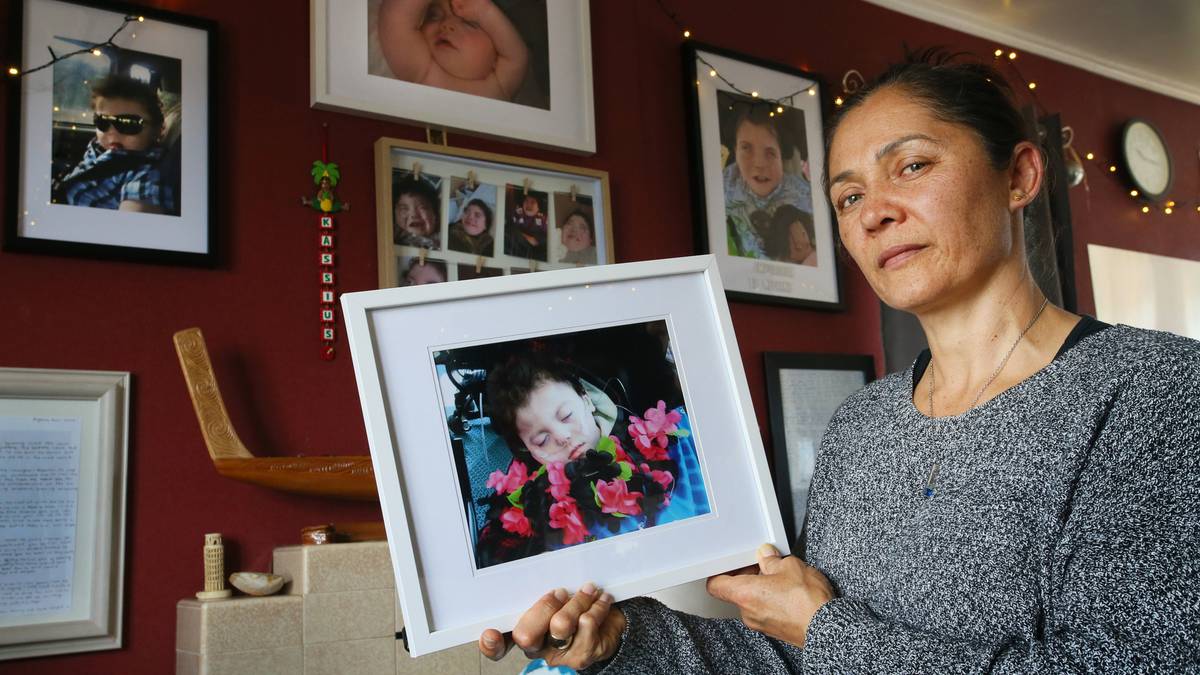Julie Hepi says her son Kassius was a “cheeky” and “clever” boy. Photo / Tania Whyte
The family of a late teen – the first Kiwi kid to be diagnosed with Pallister-Killian Syndrome (PKS) – say he fought a battle his namesake Muhammad Ali would be proud of.
Thirteen-year-old Kassius Hepi, from Onerahi, died on August 10 – after living eight years longer than doctors predicted.
He was the first child born with the sporadic mosaic condition in New Zealand and was one of 300 to 500 kids worldwide diagnosed with PKS.
The syndrome is an extremely rare genetic disorder present at birth and caused by the existence of a small extra chromosome in some cells of the body.
The signs and symptoms of the condition vary from child to child and range in severity but typically children have extremely weak muscle tone, intellectual impairment, developmental delays, distinct facial features, skin pigmentation differences and seizures.
Kassius – the youngest of four – was unable to walk, sit, speak, eat, or control his head movements; he had low muscle tone, seizures and later in life respiratory failure.
/cloudfront-ap-southeast-2.images.arcpublishing.com/nzme/Z3T4AKRKJ2ZEP2RUTY3CSQM24A.jpg)
“A Starship [Hospital] doctor told us when Kassius was 5-years-old […] ‘he will either die today and if not, he will definitely not make his teens’,” mum Julie Hepi said.
“No one in Whangārei hospital had heard of PKS except for ophthalmologist Brian Kent-Smith because he had been, way back in the day, working in Africa and he’d read lots of books and that’s how he knew about it.”
But Hepi’s “cheeky” and “clever” son, named after great American boxer Muhammad Ali – born Cassius Marcellus Clay Jr – put up the fight of his life.
“[We named him after Ali] without knowing that he would also be a great fighter throughout his whole life.”
Long stints were spent in the hospital as Kassius battled pneumonia, infections, and most recently seizures. When he was three he had 13 hospital admissions in eight months.
“He almost died many times and proved doctors wrong every time,” Hepi said.
However, intense seizures became a feature of Kassius’ later years – a 40-minute episode took his life.
Yes, there were the hardships PKS embedded into Kassius’ life but the teen’s years were full of love, laughter – colourful lights and a good taste in music.
“Funny, he likes old-school music,” Hepi said.
“He didn’t kind of like the newer stuff, although his older brother tried to get him into techno.”
Hepi said the whānau had a personalised neon sign created as a gift for Kassius’ 13th birthday.
His name was illuminated in his favourite colour blue, followed by Muhammad Ali’s famous quote, “impossible is nothing”, which had become the whānau’s mantra.
/cloudfront-ap-southeast-2.images.arcpublishing.com/nzme/33GBNJWKCQ45AOQUKQL7X2R34I.jpg)
His wheelchair was decked out with Christmas lights – same with his bedroom, which still now has the warm, colourful glow usually savoured for the festive season.
“We always made sure he had lights at Christmas time. He pretty much stared at the ceiling most of his life so why not make it interesting for him.”
Lights were just one part of Kassius’ vibrant world that the budding artist often transferred from real life onto canvas.
/cloudfront-ap-southeast-2.images.arcpublishing.com/nzme/2ZHBZ4GJ7ZY5ZMVQPLGQQDLFL4.jpg)
Although he couldn’t control his arms and hands or hold a brush, he would move his paint-laden hands and feet to create striking images that echoed life around him.
“Kassius’ grandpa was the first to see animals and people in his paintings,” Hepi said.
And lots of birds, she added.
/cloudfront-ap-southeast-2.images.arcpublishing.com/nzme/3TNUD54Z6QM624VTHZ3PF4OY5E.jpg)
Kassius once painted with his feet two figures that had a startling resemblance to Mary and Joseph bending over a crib. Another time he created the image of a rib cage shortly after his sister Shalia, also his devoted carer, was seriously hurt in a car crash.
“Kassius only painted these things for people he loved. If he did paintings at daycare or school, they didn’t have any noticeable pictures,” Hepi said.
/cloudfront-ap-southeast-2.images.arcpublishing.com/nzme/AQAOOO5STPYOKBRH5TDWU4VJUQ.jpg)
The imprint Kassius left on people was evident when the Waikanae Lions Club – where the teen’s nan was a caterer – teamed up with the Onerahi Lions Club to walk 500km to raise money for Kassius’ first disability van.
His reach stretched beyond New Zealand’s borders to Texas, where the mother of a PKS child began a Givealittle page to help Kassius’ family after his death.
Hepi said the send-off for her son, while underpinned with heartbreak, was about sharing the laughter and joy Kassius was so well known for.
“I truly believe he was ready to go. He had defied the doctors, lived longer than they said he would, yeah, he was ready.”
The whānau are giving Kassius’ equipment, resources, and most significantly his lights to other families with disabled children and Kind Hands Respite Care Cottage.
“It’s so hard. For example, nappies, you’re allocated two a day and that’s all you get for children. We were able to get Kassius up to four a day […] but there are still kids who only get two,” Hepi said.




